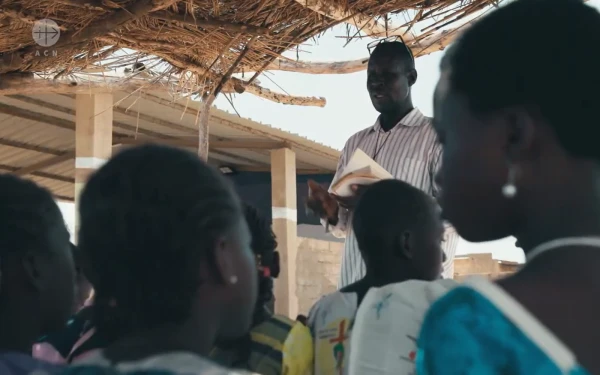Aid to the Church in Need in Spain (ACN) has awarded its annual religious freedom award to Mathieu Sawadogo, a catechist from Burkina Faso who was kidnapped for four months, during which time he prayed 700 Hail Marys daily.
Sawadogo began his catechetical work in 1999. In 2015 he was sent to the border with Mali “when the terrorists were approaching,” according to his own testimony broadcast by ACN Spain.
Receive the main news from ACI Prensa by WhatsApp and Telegram
It is increasingly difficult to see Catholic news on social media. Subscribe to our free channels today:
“Thanks to Jesus Christ, I had courage,” says Sawadogo, who was kidnapped in May 2018 by terrorists along with his wife, who was five months pregnant, after they were threatened on several occasions: “If you continue doing what you are doing, bad things will happen to you,” they were told.
Both remained in a camp in the desert, where they tried to force his conversion to Islam, giving him a Muslim name and clothing.
“I thought they would kill me, but I was not afraid. I lost hope of living, but I never renounced my faith. I chose to die a martyr. Since we did not have rosaries or religious objects, at night we used pebbles as beads to pray.” Every night my wife and I we prayed 700 rosary beads” he remembers of his captivity.

Finally, four months later, in September, they were released and began their journey back. It took them 15 days to reach the place where only the ruins of their devastated house remained, consumed by flames.
Among the ashes, he found the Bible that the bishop gave him when he appointed him a catechist.
After his release, the bishop asked him if he wanted to stop being a catechist. He had no doubt: “Many died martyrs to bring us the Gospel. If we promised to follow Jesus through thick and thin, we cannot deny it in trials.”
The action of the Islamists has caused more than 2 million Burkinabe displaced.
Religious persecution in Africa
Burkina Faso is one of the 24 countries where religious persecution occurs according to the Religious Freedom Report that has been presented today in various places around the world, and which has been prepared for 25 years by ACN.
It is understood that a country suffers religious persecution when “there are people who suffer serious and continuous acts of violence or harassment due to their religious belief”, and whose origin may be in governments, armed groups or individuals and includes “hate crimes, attacks, threats or initiatives that seek to disperse or silence their religious communities.”
In global terms, and despite registering a drop of 21% compared to the previous year, Burkina Faso recorded the 20% of all deaths linked to terrorism in 2024 in the world.
The ACN Report highlights that “since 2015, jihadist violence has transformed the country, a former model of religious harmony, into the epicenter of extremist activity in the Sahel.”
Extremist groups operating in the country aim to “control rural areas by expelling those who do not share their ideology or religion. By placing Christian communities in the spotlight, their objective is not limited to spreading fear, but also to change the demographic and religious composition of the territory to gain control,” the report details.
Along with Burkina Faso, countries such as Mali, Niger, Nigeria, Sudan, Democratic Republic of the Congo, Sudan, Eritrea and Mozambique are among those that register the most and most serious attacks on religious freedom in sub-Saharan Africa.
According to the report, although jihadist groups operate autonomously, “they share ideology, tactics and resources,” while “exploiting porous borders and weak governments to spread, with a coordinated and flexible structure.”
Although they act independently, “they exchange weapons, guerrillas and propaganda, which increases their resilience and reach. Their adaptability has had devastating effects on the civilian population, including Christian communities.”

